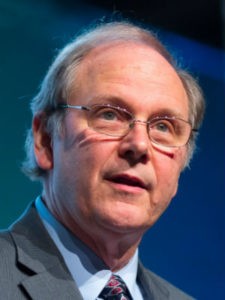I was grateful to attend the second annual lecture of the Association of Welcoming and Affirming Baptists at Wilshire Baptist Church in Dallas Sept. 11. The lecturer, Susan Shaw, is professor of women, gender and sexuality studies and director of the School of Language, Culture and Society at Oregon State University. She grew up Baptist and was educated at Southern Baptist Theological Seminary, receiving her Ph.D. there in 1987.
The author of numerous books on women’s issues, both local and global, Shaw is an engaging speaker and personable individual and should be welcomed and affirmed by any Christian congregation for who she is and what she does. But as a gay Christian, she is not accepted by everyone. That biographical feature of her story means she is excluded by many churches in her own denomination and beyond.

Robert Sellers
Shaw’s lecture was titled “Truth and Lies at the Foot of the Cross: The Church and God’s LGBTQ+ Children.” She introduced the topic by saying:
We’ve all heard how everyone’s equal at the foot of the Cross. That doesn’t seem to apply to LGBTQ+ people, however, according to many Christians. In fact, the disgust and hatred of LGBTQ+ people among many Christians (are) so great that they eagerly accept, tell, create and repeat lies and falsehoods about the queer community and work actively to limit, roll back and deny civil and human rights to (them). Surely, … of all places, the foot of the Cross is a place for truths. On the Cross, Jesus sided with the marginalized, oppressed and despised. The resurrection was God’s affirmation of that choice and, in his “coming out” of the tomb, Jesus offered hope, possibility, love and welcome.
The resurrection of Jesus is a picture of God’s desire to affirm and welcome everyone to new and abundant life. Yet, what does the word “affirming” in the distinguishing phrase, “Welcoming and Affirming,” mean to many Christians and their congregations and church leaders?
To those who refuse to be completely inclusive and to accept all people, “affirming” has limitations and restrictions. It reminds me of the Christian cliche, “Hate the sin, love the sinner,” which Shaw listed as one of the lies at the foot of the Cross. We have heard this advice more and more, especially regarding the LGBTQ community. In other words, one might say that in our church we hate the sin of people who are LGBTQ but we surely do love them!
“In other words, one might say that in our church we hate the sin of people who are LGBTQ but we surely do love them!”
Jonathan Merritt explains the falsehood associated with this mantra. In 2021, he was publicly denigrated by conservative Christians for being gay when his sermon was praised and recommended by his father, prominent Southern Baptist leader, James Merritt. The younger Merritt previously wrote:
Many who use this phrase don’t intend to harm others but wish to express love for another at some level. But the scriptural reasoning behind this phrase is unclear. Jesus never asked us to “Love the sinner, hate the sin” and neither did any other Biblical writer. ….
I think Jesus knew that if he commanded his disciples to “love the sinner,” they would begin looking at other people more as sinners than neighbors. And that, inevitably, would lead to judgment. If I love you more as a sinner than as my neighbor, then I am bound to focus more on your sin. I will start looking for all the things that are wrong with you. And perhaps, without intending it, I will begin thinking about our relationship like this: “You are a sinner, but I graciously choose to love you anyway.” If that sounds a little puffed up, self-righteous, and even prideful to you, then you have perceived accurately.
Applying this admonition to the Christian who sits in judgment of another person would be just as appropriate, and that doesn’t even consider the question of whether one’s self-identification as LGBTQ is indeed sinful or not.
A church that “welcomes but does not affirm” everyone is understood in a particular way by LGBTQ persons, explains Shylo Rosborough, the affirming ministries coordinator of St. Albans United Church near Edmonton, Alberta, Canada.
We often see these spaces as a trap. When we see and hear the phrase “welcoming,” it tells us that we are allowed to come to church and sit in the pews but not have any meaningful participation in the life of the church. If we do happen to attend, people might not be outwardly mean to us (although that does happen), (but) some people may still be praying for us to be healed from our queerness. “Welcoming but not affirming” leaves room for people to tell us that our “lifestyles” are contrary to the will of God. These messages are extremely harmful to all LGBTQ people who hear (them). …
Some congregations do their best to be welcoming, but being affirming goes deeper and is public, intentional and explicit, in their commitment to diversity and inclusion. Being affirming means that congregations use symbols and signs (such as rainbows) which are both outside and inside the church building, in worship and all other facets of church life. … An affirming congregation also has to be deliberate in their process of study, education and dialogue with members of their faith community, to ensure that the history of oppression and discrimination by the church is both understood and acknowledged, and that continued growth, education and celebration are part of its ministry. … Lastly, people who are affirming should explicitly indicate in their mission and vision statements — and everywhere else! — that the LGBTQ community is a part of and embraced in all facets of church life! Being affirming requires churches to be explicit about their inclusion because so many Christians have been so explicit about their exclusion.
“I do not affirm all the behavior of the people in the church now. To be explicitly confessional, I do not affirm all my own behavior!”
I have believed for a long time that the word “affirming” in “welcoming and affirming” has been misunderstood. It does not mean welcoming people and affirming their behavior. I do not affirm all the behavior of the people in the church now. To be explicitly confessional, I do not affirm all my own behavior!
Instead, the phrase means welcoming and affirming all people as children of God, as neighbors we are commanded to love like we love ourselves, as those whom God may choose and use to do God’s work in the world, as people of infinite worth and as our siblings in the human family who are just like us in so very many ways.
As Rosborough summarizes, “The difference between being ‘welcoming’ and ‘affirming’ is all about whether or not one can regard LGBTQ people as fully human or not … (and) that we are children of God created equal to them, capable of living into our Christian faith as an LGBTQ person.”
We should affirm LGBTQ individuals because each of them is created by God and is therefore worthy and declared “good” by the Creator.
Arthur Wright Jr., pastor of Williamsburg Baptist Church in Virginia, begins enumerating his “10 reasons your church should be welcoming and affirming” with the conviction that “LGBTQ people are made in the image of God.” He says:
This is a foundational message from the very beginning of Scripture. Scripture as a whole testifies to a God who invites people from the margins to the center, with the dream that all might flourish. Our churches should be welcoming and affirming of all because all people bear the imago Dei.
Affirming LGBTQ people as God’s good creation is a part of the published statements of typical welcoming and affirming congregations across the United States. For example:
- First Baptist Church of Berkeley, Calif. — Believing that God’s grace and redemptive love embrace all, we endeavor to be reconcilers in the world.
- Crossroads Church, Kansas City, Kan. — Central in our values is a desire to create space that is loving and inclusive of all persons and that empowers each person to live, serve and lead as God calls them.
- First United Church, Bloomington, Ind. — We welcome all into full membership and participation as children of God, and we affirm and celebrate all loving, committed relationships.
- Trinity Church, Northborough, Mass. — We recognize all human beings as worthy and loved by God.
- Empowerment Liberation Cathedral, Washington, D.C. — Everyone is invited to experience our worship — no matter your gender, race, age, sexual orientation, identification, handicap, or former faith background. All are affirmed and welcomed here.
Moreover, this is the foundational truth which Susan Shaw declared lies at the foot of the Cross: “We are here. We are queer. And we’re made in God’s image.”
So, I maintain that we, both as individual Christians and as congregations, must check ourselves on how we interpret the word “affirming” in the maxim “welcoming and affirming.” Do we and our congregations sit in judgment of the behavior of some people who want to serve God through our church? Or do we recognize that everyone in the church, including ourselves, is a person made of imperfect clay and that by the grace of God we all can belong in God’s family? Do we think there are certain behaviors — or identities — that negate God’s love and make unnecessary our own? Or do we believe all of us, including the people who may feel they are at the margins, and especially the LGBTQ community, are exactly the people Jesus included in his circle of beloved followers?
Indeed, what do we mean by “affirming”?
Rob Sellers is professor of theology and missions emeritus at Hardin-Simmons University’s Logsdon Seminary in Abilene, Texas. He is a past chair of the board of the Parliament of the World’s Religions in Chicago. He and his wife, Janie, served a quarter century as missionary teachers in Indonesia. They have two children and five grandchildren.
Related article:
At AWAB lecture, Susan Shaw lays out 10 lies Christians tell about queer people


